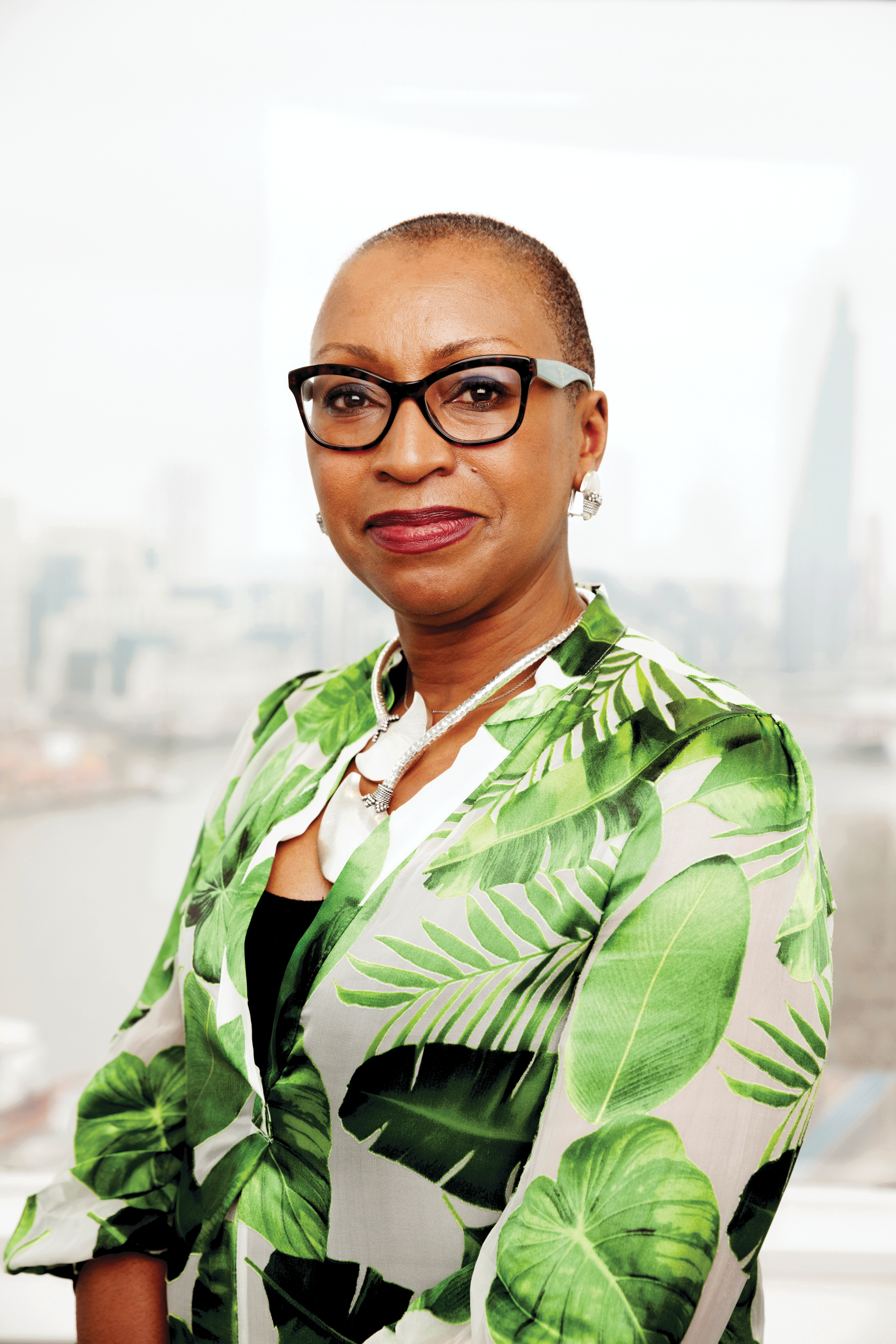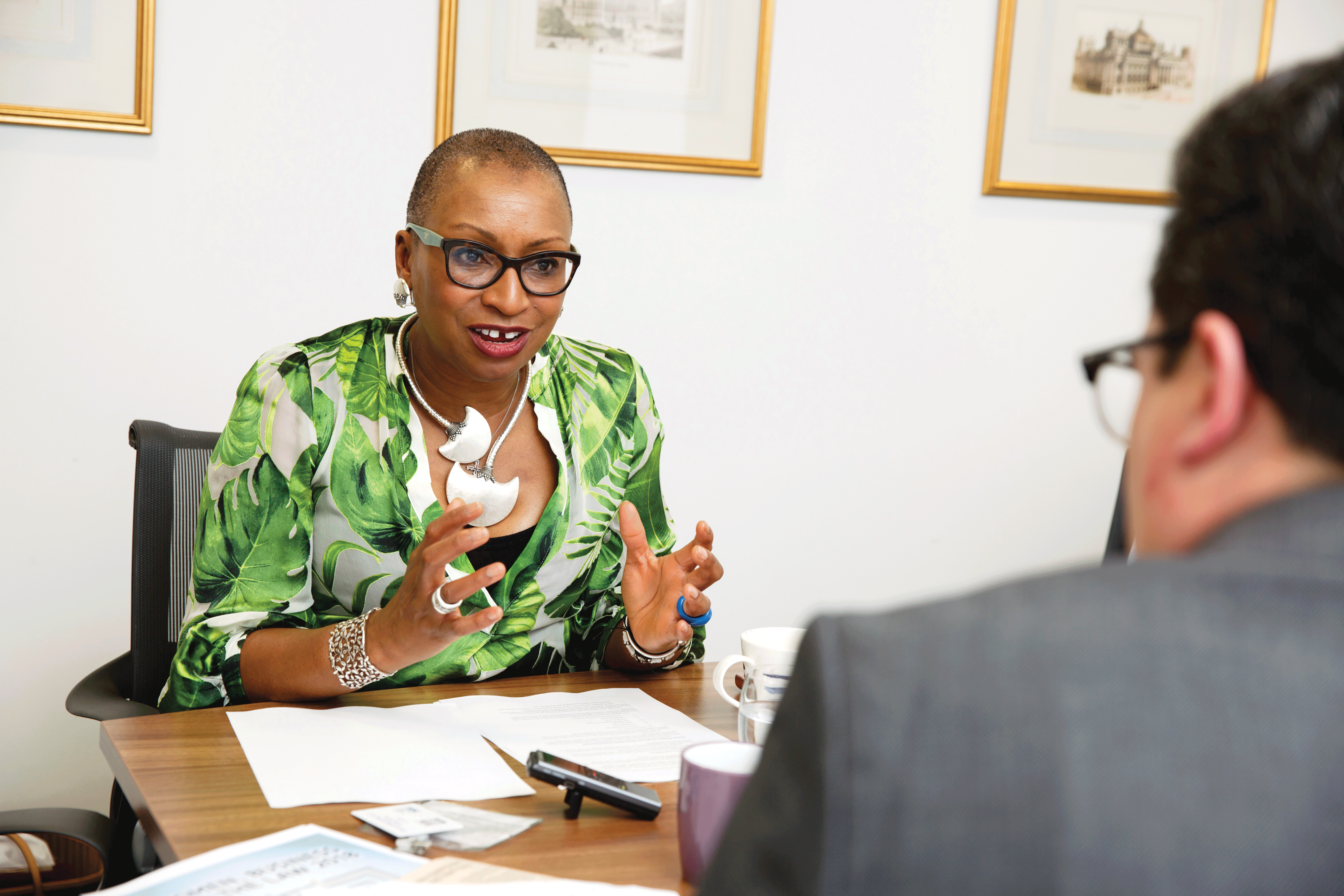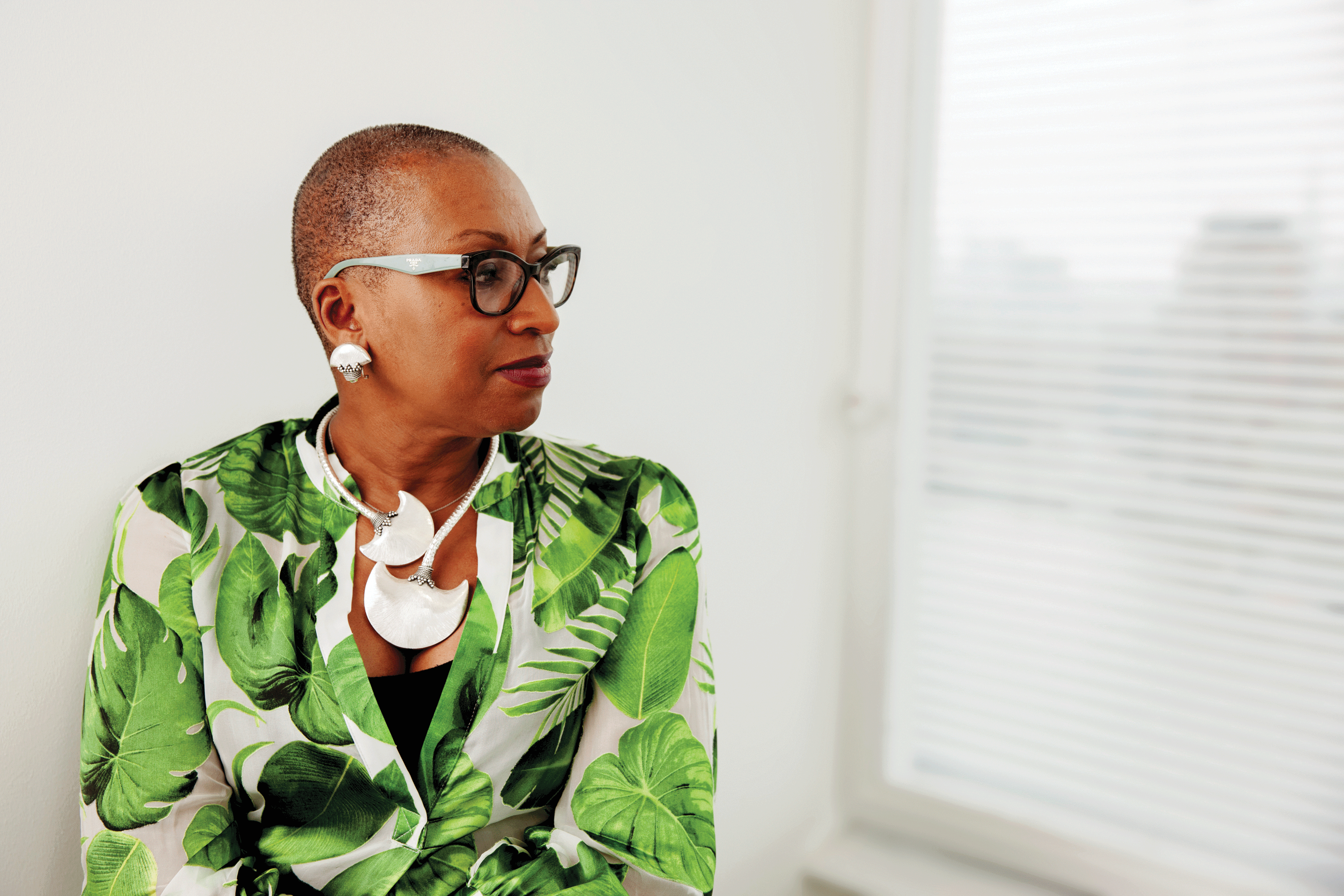How can a lawyer help end world poverty and spread the benefits of economic growth? It starts with remembering to make your bed, World Bank general counsel Sandie Okoro tells Eduardo Reyes.
We are sitting in Millbank Tower, most of London below us blurred by a thin mist. The capital has higher buildings but, in defiance of Lord Denning’s dictum, here on the 12th floor we are above the law. ‘The World Bank has privileges and immunities,’ Sandie Okoro begins. ‘We are not subject to any external law or regulation, or courts.’ As the bank’s general counsel and senior vice-president, this is less liberating than it sounds: ‘We have our own internal laws and regulations – maybe more than I’ve ever seen in any other organisation. There is no external court to which you then refer legal matters. We are the rule of law.’
The bank has the checks, balances, sanctions and dispute mechanisms any state would need. Employment issues might end up in its own administrative court, but not in an employment tribunal. It is not that striking aspect which makes this Okoro’s ‘dream job’, but handling the bank’s immunity from suit well is key to its credibility.
And that status is closely guarded, Okoro notes: ‘If we were not to have these privileges and immunities, you can imagine that a lot of the money that now goes into development wouldn’t do so. We’d have to be subject to regulation in every country in which we do business; we would be subject to the laws and, therefore, to suit. When you’re subject to suit, you have to pay damages, which is money that’s not going into development.’ Such litigation as the bank experiences is focused on guarding its immunity and privileges when these are challenged.
The World Bank, a UN agency, is part of the post-war ‘architecture’ underpinned by the enduring ‘Washington Consensus’. This is a world view that assumes development, trade and good governance can be tuned to work in concert to the benefit of all. That consensus has come under severe strain in the wake of the global financial crisis and the renewal of cold war tensions. But whereas those tensions have paralysed some global institutions, the World Bank, whose ‘shareholders’ are governments, has pressed ahead with an ambitious development agenda.

It is that agenda that makes this Okoro’s dream job. She had long balanced a private focus on pro bono, and time spent promoting diversity and equality projects, with work in commercial legal departments. But this is a role, she recalls, that ‘found’ her while she was global general counsel at HSBC’s retail banking and wealth management division. ‘I was headhunted, so it came out of the blue,’ she says. Her reaction was, ‘No way could I do this job, you’ve got the wrong person’.
Okoro went on holiday and changed her mind: ‘I thought, wait one second. I’m doing the typical female thing of counting yourself out, thinking you can’t do it, [whereas] that’s for the bank to decide… I was in Hawaii having a cocktail and thought, “Let me ring the headhunter”.’ The bank was still looking and she let her name go forward. What followed was ‘a very formal process’, culminating in an interview with bank president Dr Jim Yong Kim.
A year in, Okoro is in her element. Large commercial banks are typically cautious about allowing employees a platform and a profile, and her global role at HSBC entailed a more low-key approach than she had taken as general counsel at the smaller asset manager Barings. By contrast, the World Bank promotes senior people’s Twitter handles (@sandieokoro), encourages them to write blogs and, unlike at many international institutions, its leaders will address audiences with humour and a candid lack of formality. Photos tweeted of Okoro visiting projects in Liberia, Ghana and Ivory Coast seem to have a celebrity tinge. In one she is surrounded by schoolchildren; in another she is riding a motorbike. Her speaking style adds to the ‘star’ aura. Neither Okoro nor Kim needs or seems to like speaking from notes, and both are very well received.
She says any such impression is a by-product of the bank’s academic culture – something lacking in a corporate environment. ‘It wasn’t as constrained as I was expecting,’ she explains, ‘they really do believe in academic freedom. You’ve got so many economists here… one of the first things that struck me was just how many degrees everybody had.’ Many of her lawyers have PhDs and speak three or four languages.
TRILLION DOLLAR MAYBE
A sustained worldwide fall in interest rates is an opportunity for the World Bank to put trillions of dollars of private money to work in the quest to end world poverty, the bank’s president Dr Jim Yong Kim says.
He describes the $60bn-$65bn a year the bank devotes to this cause as ‘a drop in the ocean’ compared to the need. ‘The private sector needs to be much more involved,’ Dr Kim argues.
He has in his sights the $7tn held in negative-interest-rate accounts, the $10tn in low-yield government bonds and the estimated $9tn held in cash. Financial instruments created or facilitated by the bank could provide a higher return.
The bank has a track record in other financial innovations. Troubled by the length of time it took to release funds to fight the Ebola crisis in west Africa, the bank created three-year ‘pandemic bonds’ – $450m is now ready for dispersal in the event of a pandemic. The bank is also developing ‘famine insurance’.
For those in leadership positions, there is a serious point to having a ‘voice’, says Okoro. It helps to achieve the bank’s aims, serve its themes and promote projects: ‘I have a voice and I’m going to use it to highlight issues to do with gender and gender-based violence. It would be remiss not to raise these issues when they’re core to our development outcomes, and they’re issues that need to be raised.’
Legal analysis is a key element of one the bank’s annual projects – a report on ‘Women, Business and the Law’. It seems to highlight a potential problem. While the bank’s own principles and values include the promotion of gender equality, in this global audit more than half of its ‘shareholder’ contributors are governments that place restrictions on women’s ability to work.
In this regard, Okoro insists the bank can be stronger than the apparent sum of its parts and does not need to temper its goals. She affirms the suggestion that the bank can, on key issues, be ahead of the median position of its members on equality. But will countries endorse that position?
She says they accept it: ‘What is really interesting is how collaborative and collegiate everything is at board level.’ Board consensus sits behind every bank project, and this extends to development goals which, through the projects it finances, encompass aims on equality and the environment. ‘So, yes, different countries may have different views,’ Okoro notes. But as the bank has a ‘political prohibition’ in its articles, decisions can only be based on development outcomes. The UN itself does not have that same prohibition, she notes, so diverging national approaches hold more sway there.
More for less
The bank has financed close to $1tn of development since its foundation, a figure it now wants to multiply by finding ways to unlock the trillions of dollars sitting in private interest-negative bank accounts.
The bank is currently financing 1,713 projects with a value of $200.46bn in 21,890 locations across 146 countries.
But covering that ambition is a surprisingly small legal vice-presidency (the bank is organised by its vice-presidential remits). Okoro has 184 staff, 128 of whom are lawyers. That is not sufficient to have a lawyer in every country where the bank has a project, but they are present in every region. While the bank has its own legal needs, the lion’s share of legal work is ‘operational’. Lawyers deal directly with the governments – the office of attorneys general in particular. ‘We’re trying to get some more [lawyers out] there because it works better when you’re closer to your clients – our clients being governments,’ Okoro says.
Having worked in the City and financial services during and after the global financial crisis, Okoro is well-schooled in the in-house legal team’s need to do more with less. Over the past year there have been changes to the way the legal department operates.

‘We have undertaken a huge change process,’ she says. This was an internal project, run with no outside advice. Instead, Okoro asked for volunteers for a ‘change team’. As a result, ‘we stopped doing some things we had traditionally done,’ she explains. Whereas every project and agreement had always been sent to ‘top counsel’, these are now dealt with at the lowest appropriate level. Electronic signatures were introduced and long, formal terms and conditions that ‘just make us feel lawyerly’ were ‘revamped’. The team also identified document types that were routinely sent to lawyers which did not need to be: ‘Some documents need a legal opinion with them. Most don’t.’
Her pride in the change volunteers is obvious. ‘You would think Boston Consulting Group had done it,’ she says. ‘I’m convinced we could have paid a consultant a lot to do it and got something worse.’This is ‘just the beginning’, she adds: ‘We’re [now] looking at the whole question of legal risks, a top-10 that everything in our advice can be related to.’
The ability to handle risk is the strongest link Okoro makes with previous roles, even though the World Bank is plainly unique. ‘I’ve spent time identifying what the legal risks are for the bank as an institution,’ she says, ‘making sure that we are helping the bank take calculated risks, because we’re not going to reach our development goals if we don’t.
‘It’s the same for every institution that I’ve ever worked in. The external environment becomes harder and harder, whether it be regulation, reputational issues… and you need your lawyers close by to make sure that you’re taking informed and calculated risks.’ That is needed, ‘even with our privileges and immunities’, she stresses.
Experience of advising on innovative financial instruments should help; this is an area Dr Kim has marked for expansion. Ideas include ‘famine insurance’, which would pay out faster than current aid packages. He also points to the global estimate of $7tn currently in ‘interest-negative’ accounts as funds that could be put to work for development (see p26). Even before Okoro’s arrival, the bank’s lawyers had supported the creation of ‘pandemic bonds’.
‘Given all these new bonds that had not existed in the markets before, I have a highly skilled finance team,’ she notes. ‘Many come from the private sector and put together these instruments. They are hugely complicated and innovative.’
Core purpose
At a time when aid and development budgets are under pressure, and some organisations that deliver aid face censure for turning a blind eye to alleged misconduct by field officials, the World Bank’s confidence in its purpose is striking. It does not behave like an organisation on the back foot.
In a recent lecture, Dr Kim pointed out that in 1963 his native South Korea was judged by the bank to be so poor as to be unlikely to be able to repay a loan. The bank now has more confidence running projects in such an environment.
‘Let me pick out Liberia, which I’ve just come back from,’ Okoro says. With a recent past including civil war and Ebola, Liberia’s needs are massive – but it is not judged too high-risk. The bank, which has a triple-A credit rating and never requires security, can borrow money when ‘somewhere like Liberia can’t’. Rebuilding infrastructure, she points out, will improve Liberia’s ability to grow, leading it away from the ‘fragility, conflict and violence’ that reinforces the country’s poverty. Conditions set on a loan can reinforce the appropriateness and sustainability of projects. For a new road, she says, there are ‘very strict conditions around resettlement and environment’.
The problems of the rural poor dominate the bank’s thinking. It is funding a new metro system in Lima to cut the journey of the working poor who do not live in the city from three hours to 30 minutes. And in Liberia, she was impressed with bank staff who introduced an initiative to improve the safety of schoolgirls with a ‘walking bus’.
As the interview concludes, I recall that when addressing audiences of aspiring lawyers, Okoro always recommends an improving book. What is inspiring her as she begins her second year at the bank? She cites Make Your Bed – Small Things That Can Change Your Life by Admiral William McRaven. ‘It is these routines that help you start your day well because if you get your first task done, you’re then task-orientated for the day,’ she explains. ‘It really works – and now I can’t not make my bed.’
BIOG
BORN:
London
EDUCATION:
Putney High School
University of Birmingham
Inns of Court Law School
Law Society Finals
ROLES:
Graduate trainee, Coopers & Lybrand (1987-89)
Trainee solicitor, Stoneham Langton & Passmore, Mayfair (1989-91)
Head of legal for corporate services, Schroders (1991-2007)
Global GC, Barings (2007-2014)
Global GC, HSBC retail banking and wealth management (2014-2017)
GC and senior vice-president, World Bank (2017-present)
KNOWN FOR:
Top-10 women changing the City (the Guardian)
Power 100 Women (City AM)
Lifetime achievement award (Black Solicitors’ Network)
Honorary bencher, Middle Temple
Law Society ‘ambassador’, Diversity Access Scheme
Governor, Royal Shakespeare Company
































No comments yet